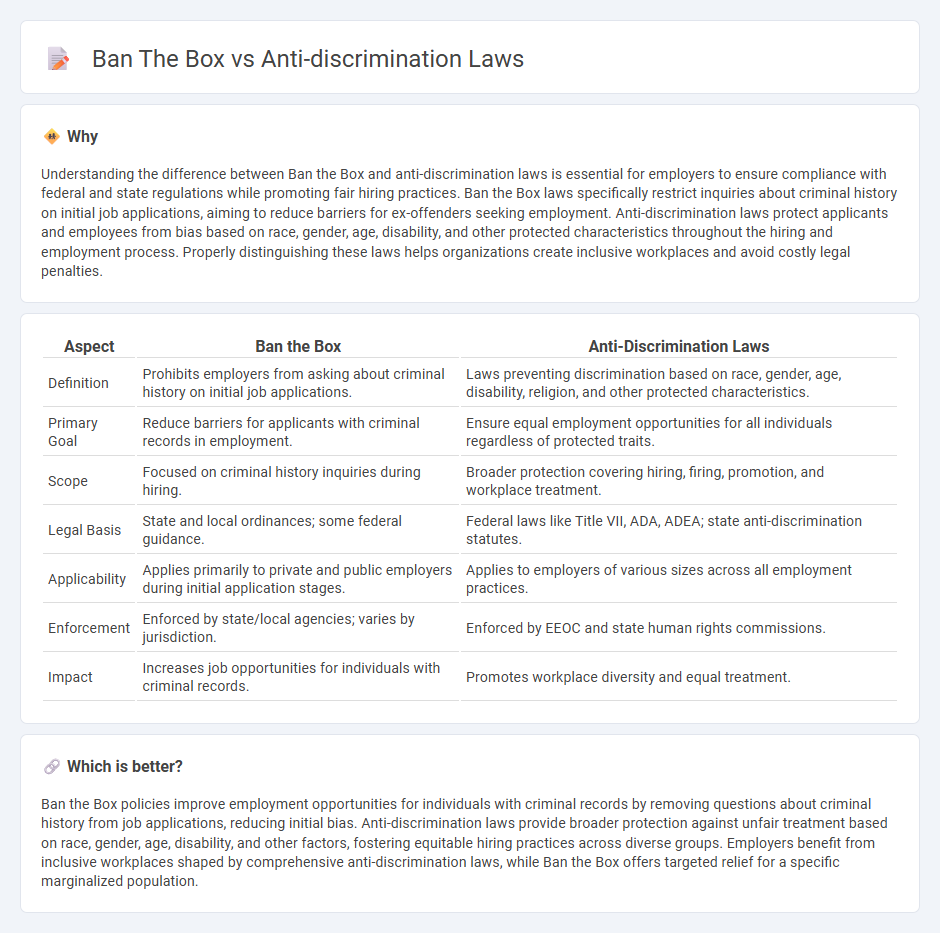
Ban the Box policies remove criminal history questions from job applications to increase employment opportunities for individuals with criminal records. Anti-discrimination laws, such as Title VII of the Civil Rights Act, protect candidates from biases based on race, gender, age, and other protected characteristics. Explore how these regulations shape fair hiring practices and promote workplace diversity.
Why it is important
Understanding the difference between Ban the Box and anti-discrimination laws is essential for employers to ensure compliance with federal and state regulations while promoting fair hiring practices. Ban the Box laws specifically restrict inquiries about criminal history on initial job applications, aiming to reduce barriers for ex-offenders seeking employment. Anti-discrimination laws protect applicants and employees from bias based on race, gender, age, disability, and other protected characteristics throughout the hiring and employment process. Properly distinguishing these laws helps organizations create inclusive workplaces and avoid costly legal penalties.
Comparison Table
| Aspect | Ban the Box | Anti-Discrimination Laws |
|---|---|---|
| Definition | Prohibits employers from asking about criminal history on initial job applications. | Laws preventing discrimination based on race, gender, age, disability, religion, and other protected characteristics. |
| Primary Goal | Reduce barriers for applicants with criminal records in employment. | Ensure equal employment opportunities for all individuals regardless of protected traits. |
| Scope | Focused on criminal history inquiries during hiring. | Broader protection covering hiring, firing, promotion, and workplace treatment. |
| Legal Basis | State and local ordinances; some federal guidance. | Federal laws like Title VII, ADA, ADEA; state anti-discrimination statutes. |
| Applicability | Applies primarily to private and public employers during initial application stages. | Applies to employers of various sizes across all employment practices. |
| Enforcement | Enforced by state/local agencies; varies by jurisdiction. | Enforced by EEOC and state human rights commissions. |
| Impact | Increases job opportunities for individuals with criminal records. | Promotes workplace diversity and equal treatment. |
Which is better?
Ban the Box policies improve employment opportunities for individuals with criminal records by removing questions about criminal history from job applications, reducing initial bias. Anti-discrimination laws provide broader protection against unfair treatment based on race, gender, age, disability, and other factors, fostering equitable hiring practices across diverse groups. Employers benefit from inclusive workplaces shaped by comprehensive anti-discrimination laws, while Ban the Box offers targeted relief for a specific marginalized population.
Connection
Ban the Box policies and anti-discrimination laws intersect by promoting fairness and equal opportunity in employment practices. Ban the Box removes criminal history questions from initial job applications to prevent biased screening against formerly incarcerated individuals. Anti-discrimination laws, such as Title VII of the Civil Rights Act, further protect candidates from unfair treatment based on race, gender, disability, or other protected characteristics, ensuring more inclusive hiring processes.
Key Terms
Equal Opportunity
Anti-discrimination laws prohibit unfair treatment based on race, gender, age, or disability to ensure equal opportunity in employment and education. Ban the Box policies remove criminal history questions from job applications, reducing barriers for ex-offenders and promoting workforce inclusion. Explore how these measures collectively advance fair hiring practices and equitable access to opportunities.
Criminal History Disclosure
Anti-discrimination laws restrict employers from considering certain personal characteristics, including criminal history, to prevent unfair treatment during hiring. The Ban the Box initiative removes the criminal history question from initial job applications, delaying disclosure until later in the hiring process to reduce bias against people with past convictions. Explore how these legal measures interact to promote fair employment opportunities for individuals with criminal records.
Protected Classes
Anti-discrimination laws protect specific Protected Classes including race, gender, age, disability, and religion, ensuring equal treatment in employment and housing. Ban the Box policies specifically target the hiring process by removing questions about criminal history on initial job applications to reduce bias against individuals with a criminal record. Explore more insights on how these legal frameworks impact workforce diversity and inclusion.
Source and External Links
Overview of Federal Employment Discrimination Laws - Federal anti-discrimination laws, including Title VII, the ADA, ADEA, and others, prohibit discrimination based on race, color, national origin, religion, sex, age, disability, and genetic information in employment practices, enforced by the EEOC and DOJ.
Anti-discrimination laws & legislation in the United States - Key U.S. laws like Title VII of the Civil Rights Act, the ADEA, the ADA, and the Equal Pay Act protect employees and applicants from discrimination based on various protected characteristics, including age, disability, sex, race, and national origin.
Ending Illegal Discrimination And Restoring Merit-Based Opportunity - A 2025 presidential order reiterates the enforcement of federal civil-rights laws protecting individuals from discrimination on race, color, religion, sex, or national origin and condemns unlawful diversity policies that violate these protections.
 dowidth.com
dowidth.com